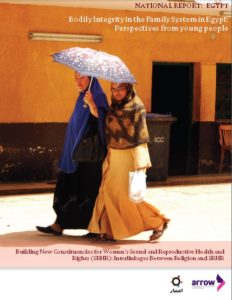Bodily Integrity in the Family System in Egypt: Perspectives from young people
This research aims to explore the concept of “Bodily Integrity” for young Egyptian women and men (18–29 years) within the family system and the effect of religious fundamentalism and social conservatism discourse that seeks to limit the control of young women and men over their bodies and rarely holds parents accountable for harmful practices.
Traditional religious and family values in Egypt, introduced to protect young people, can restrict their understanding and practice of their Sexual and Reproductive Health and Rights (SRHR). It is usually assumed that young people, especially young women, do not need to know about such issues until they are married. This idea is rooted in inherited values and long-standing taboos surrounding sexuality and such values are guarded by the family; either the parents and/or the extended family.
For this reason, the family rests at the core of this discussion on SRHR. Advocacy of young people reclaiming ownership of their bodies should focus on changing the discourse that such acts will “harm the family and the whole society”, which draws on religiously justified arguments.
This evidence-based research used different data collection tools to answer questions about two main dimensions of “Bodily Integrity”, which are “Self-Ownership” and “Accountability”, to open a discussion about the influence of the family system on the bodily integrity of its members, especially women. The research team conducted a focus group discussion with young women, ten interviews with young men and two verification sessions for the findings in addition to an online survey.
The main results of this fieldwork find a need to organize Comprehensive Sexuality Education (CSE) for young men and women, starting at the early stages of the education system, and for this education to adopt an SRHR approach.
Download the full research Bodily Integrity in the Family System in Egypt Perspectives from young people

